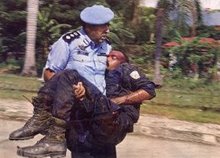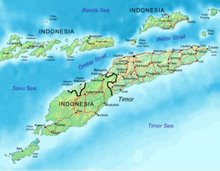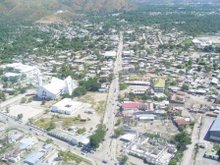| March 30,2007 | ||
| ||
| "The program started at the beginning of January and will be carried out for one year," according to Father Martinho Germano da Silva Gusmao, head of the Commission for Justice and Peace for Baucau diocese, based about 100 kilometers east of Dili. The priest told UCA News on March 26 that young people from Dili diocese have visited their counterparts in Baucau three times since the program began. The two dioceses cover eastern and western Timor Leste, respectively. Catholics form an estimated 96 percent of the country's 1 million people. Approximately 200 participants, accompanied by their parish priests and some nuns and seminarians, took part in each visit, during which the young people shared experiences and asked each other for forgiveness. Father Gusmao said young people from Baucau diocese will go next month to visit their counterparts in Oecussi, a Timor Leste enclave in neighboring West Timor, part of Indonesia. Oecussi is in the territory of Dili diocese. "The young people are willing to publicly acknowledge their mistakes and promise not to repeat them," the priest said. He explained that he initiated the program to show there is no discrimination between easterners and westerners in the Church. Communal violence erupted in Timor Leste in April 2006 in the wake of the dismissal of more than a third of Timor Leste's army. The dismissed soldiers, from the western part of the country, had protested alleged discrimination against them. The easterners, it is claimed, were the backbone of the resistance against Indonesian rule during the 1980s and 1990s. Tensions sparked by the soldiers' complaints and dismissal degenerated into clashes between groups claiming to represent easterners and westerners. At least 20 people died and 100,000 were displaced, taking refuge in camps, many of which were set up in Catholic churches and centers. The Ministry of Social Affairs, Labour and Solidarity reports 64,367 people still living in 44 refugee camps in the Dili area, where the violence was concentrated. People sheltering in these makeshift camps remain fearful that violence would await them should they return to their homes. Some cannot return, since their homes were burned in the rioting. Several people told UCA News they appreciate the youth program. Maria Angelina Lopes Sarmento, executive director of Timor Leste Forum of Non-Government Organizations, praised the Catholic Church for its "significant role in reconciling people." She cautioned, however, that justice must not be neglected. "Reconciliation does not mean freeing young people who have killed others or committed violence. They must be put on trial." Magdalena da Silva, a 47-year-old housewife, said she has no grudge against those who looted and burned her house, "because they are also victims -- used by certain people for their interest." The most crucial need, she said, is for perpetrators to ask forgiveness in front of those they harmed and promise not to inflict violence anymore, and for those harmed to forgive the perpetrators. Arthur Ornai Fernandes Madeira, who stays in a refugee camp in Dili, said he supports the Church's reconciliation efforts with the hope that Timor Leste will never again have to suffer communal conflict. Father Adrianus Ola Duli, parish priest of Mother Mary of Lourdes Church in Ermera, told UCA News he now sees unity in the district, 30 kilometers southwest of Dili. "When I go to my communities, I observe that people who were directly involved in the conflict now live together with the easterners without any discrimination and suspicion," he reported. The Ministry of Social Affairs, Labour and Solidarity has been running its Simu Malu (mutual acceptance) program since June 2006. Jaime Hanjam, its coordinator, told UCA News the program involves dialogue, workshops and football competitions between easterners and westerners. The program is set to continue until all refugees return home. | ||
sábado, 31 de março de 2007
Church runs reconciliation program for youths to end 'East-West' conflict
Subscrever:
Enviar feedback (Atom)







Sem comentários:
Enviar um comentário